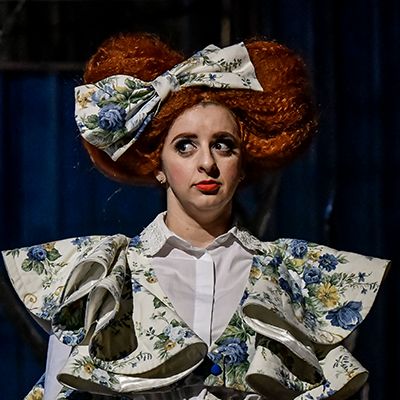| Slovak National Theatre | ||
| Jaroslav Kyzlink | Musikalische Leitung | |
| Zuzana Fischer | Regie | |
| David Janošek | Bühnenbild, Kostüme | |
| Daniel Tesař | Licht | |
| Orchestra of the Slovak National Theatre | ||
| Choir of the Slovak National Theatre | ||
| Jan Tranta | Licht | |
| Jozef Červenka | Dramaturgie | |
| Zuzana Kadlčíková | Chorleitung | |
| Tereza Kmotorková | Choreographie | |
| Zuzana Lisoňová | Choreographie | |
| Andrea Vizvári | Sopran | Chambermaid |
| Martin Morháč | Bariton | Devil Porter |
| Jiří Zouhar | Tenor | Musician |
| Vladimir Streltsov | Bass | Marshal |
| Emil Leeger | Tänzer | Chemberlain |
| Katarína Hano Flórová | Mezzosopran | Káča (Kate) |
| Jitka Sapara Fischerová | Mezzosopran | Kate's mother |
| Peter Račko | Tenor | Jirka |
| Michal Onufer | Bass | Marbuel |
| Jolana Fogašová | Mezzosopran | The Princess |
| Peter Mikulás | Bass | Lucifer |
| Vladimir Streltsov | Bass | The Devil's Gate-Keeper |
Nobody wants to dance with the quirky and a little cheeky Káča (Kate) at a party. Angry, she declares that she would dance with the Devil. So when he arrives as the dashing Marbuelo, she is swept off her feet down to hell. With the help of the clever Shepherd Jirka, will Káča make it back to earth? Might the Devil actually be relieved to see the back of his garrulous and feisty visitor?
Dvořák wrote The Devil and Kate just before Rusalka at the height of his powers as an orchestral composer and at a period of keen interest in fairytale and mythological themes. There is much purely instrumental music partly justified by the story with its emphasis on dancing in the Act I pub scene and in hell. There are also surprisingly long scene-preludes, including a striking descent to a Nibelheim-like hell at the beginning of Act II. It is one of the few Czech operas to lack love interest altogether: Káca declares at the end of Act III that, now she has been richly rewarded for scaring off the Devil, she will be able to afford any bridegroom she likes. The Devil and Kate is one of Dvořák’s most popular operas in his home lands and is based on a fairy tale by Božena Němcová. Most Czech devils are comically incompetent; Marbuel is especially so, and is outwitted by one of the most assertive of all the strong women depicted in Czech opera. This joyous story full of movement and humour is staged by young director Zuzana Fischer, beautifully blending traditional fairytale and contemporary worlds, in OperaVision’s first stream from Slovakia - in the National Theatre’s new venue in Bratislava.
Recorded on 17.01.2025


